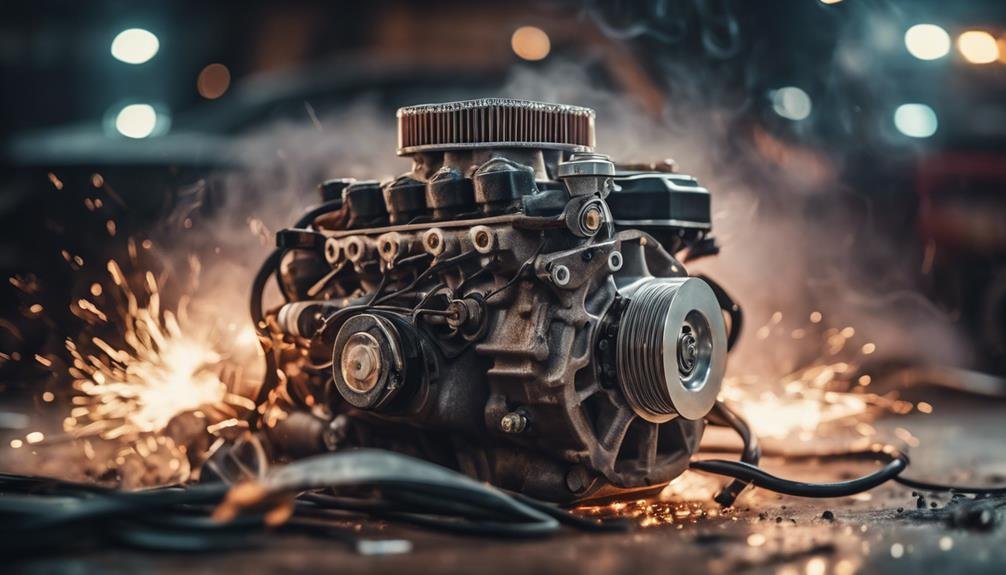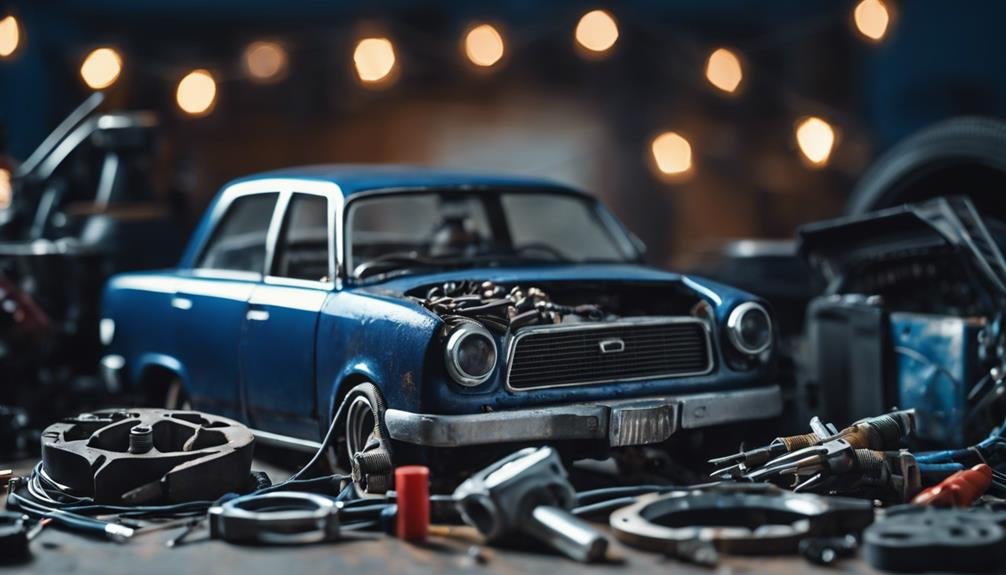When your vehicle's alternator starts to fail, you can expect to pay anywhere from $350 to $900 for a replacement, depending on factors such as the make and model of your vehicle, labor costs, and the type and quality of parts used. Labor costs typically range from $200 to $300, and extra work like replacing the serpentine belt can add $20 to $50 to the bill. Dealership costs can exceed $500 based on the vehicle, while specialty shops may offer lower prices due to faster access and fewer labor hours. As you navigate the repair process, exploring the causes of alternator failure and understanding the benefits of new, aftermarket, and used parts will help you make an informed decision.
Key Takeaways
- Alternator replacement costs range from $350 to $900, depending on the vehicle, labor, and parts used.
- Labor costs typically range from $200 to $300, influenced by job complexity and alternator accessibility.
- Additional work, such as replacing the serpentine belt, can add $20 to $50 to the total cost.
- Dealership services tend to be more expensive, often exceeding $500, while specialty shops may offer lower prices due to faster access.
- The type and quality of parts used, such as OEM or aftermarket, affect the total cost, with OEM parts usually being more reliable and expensive.
What Affects Alternator Replacement Costs
When replacing your vehicle's alternator, different factors can greatly impact the ultimate cost of the job. One important aspect is the make and model of your vehicle, which greatly influences the replacement cost.
Moreover, labor costs vary depending on the complexity of the job and the accessibility of the alternator. For example, if the alternator is located in a hard-to-reach area, labor costs will likely increase.
The type and quality of parts used in the replacement also play a significant role in the total cost. You may opt for an aftermarket alternator, which is generally cheaper, or an OEM (original equipment manufacturer) alternator, which is more expensive.
In addition, additional work required, such as replacing the serpentine belt, can add to the total cost. Lastly, the choice between a specialty shop and a dealership service can also impact the final cost.
Signs of a Bad Alternator
Your vehicle's alternator can exhibit subtle signs of failure, which you should recognize to avoid being stranded with a dead battery or other electrical issues. Dim headlights or dashboard lights are early signs of a failing alternator, indicating that your electrical system isn't functioning properly.
The battery warning light on your dashboard can also illuminate, signaling alternator issues. Unusual noises, such as a grinding or squealing noise from the engine compartment, may point to alternator problems.
Rough starts or stalling can also be signs of a bad alternator, as it struggles to recharge your battery. Moreover, malfunctioning accessories like power windows can indicate a failing alternator, as it's unable to provide sufficient power.
If you notice any of these signs, addressing the issue promptly is crucial to avoid further damage to your electrical system. A failing alternator can leave you stranded, but recognizing these signs can help you take proactive measures to prevent a breakdown.
Alternator Failure Causes and Prevention

Faulty maintenance habits, worn-out components, and incorrect usage can all contribute to alternator failure. This can be prevented with regular checks and good electrical system upkeep. As you use your vehicle, being aware of the potential causes of alternator failure is crucial to prevent it from happening.
Some common causes of alternator failure include:
- Long-term wear and tear, which can lead to worn-out bearings and slipping belts
- Leaking fluid, which can cause corrosion and damage to the electrical system
- Incorrect use of jumper cables, which can lead to overloading and alternator failure
- Overloading the alternator with high-powered accessories, which can reduce its lifespan
Repair or Replace Your Alternator
If your alternator has failed, you're now facing a decision: should you repair or replace it? The choice between repair and replacement depends on factors like cost, reliability, and warranty coverage. Here's a breakdown of the options:
| Option | Cost | Reliability |
|---|---|---|
| Repair | $100-$200 | May not be as reliable as a replacement |
| Replacement | $350-$900 | More reliable, backed by a manufacturer's warranty |
| Aftermarket Alternators | $200-$500 | May not be as reliable as OEM replacements |
| New Part | $300-$700 | More reliable, backed by a manufacturer's warranty |
| Used or Rebuilt | $100-$300 | May not be as reliable as a new part |
When deciding, consider the condition and stage of your vehicle. If your car is still under warranty, you may want to opt for a replacement to make sure you're covered. If you're experiencing symptoms of a bad alternator, such as dim headlights or a dead battery, it may be time to replace it. Remember, a faulty alternator can cause damage to other electrical components in your engine bay. Weigh the cost to replace against the potential cost of repairing other damaged components.
Understanding Alternator Replacement Prices

Replacing an alternator can cost you anywhere from $350 to $900, depending on factors such as the type of vehicle and any extra repairs needed. You'll need to bear in mind labor costs, which typically range from $200 to $300, and the cost of additional parts like the serpentine belt, which can add $20 to $50 to your total bill.
Here are some key factors to keep in mind when understanding alternator replacement prices:
- Dealership costs can exceed $500, depending on your vehicle's make and model.
- Specialty shops may offer lower prices due to faster access and fewer labor hours required.
- An aftermarket alternator can be a cost-effective option, but be sure to check the warranty and quality of the replacement part.
- A bumper-to-bumper warranty may cover alternator repairs or replacement, so it's worth checking your policy before scheduling work.
Frequently Asked Questions
What Is a Fair Price to Replace an Alternator?
You're wondering what's a fair price to replace an alternator; generally, you should expect to pay between $550 to $700, including labor, for a reliable OEM or aftermarket alternator from a reputable mechanic or shop.
What Is the Normal Price for an Alternator?
You'll typically pay between $350 to $900 for an alternator replacement, depending on your vehicle's make and model, with aftermarket options on economy cars costing around $450 and OEM ones on luxury vehicles exceeding $2,200.
How Much Will It Cost to Replace an Alternator?
You're wondering how much it'll cost to replace your alternator. Well, expect to pay between $450 and $900, depending on the type of alternator and your vehicle's requirements, plus labor costs ranging from $200 to $300.
Does Autozone Give You Money for an Old Alternator?
You're wondering if Autozone gives you money for an old alternator, and the answer is yes! They offer a core charge refund when you return your old alternator with your new purchase, helping offset the cost.
Conclusion
While considering the process of replacing your alternator, keep in mind that costs can vary depending on your vehicle's make, model, and year, along with the quality of the replacement part.
Be prepared to pay anywhere from $100 to over $1,000, including labor costs.
By understanding the signs of a bad alternator, taking preventative measures, and knowing when to repair or replace, you'll be better equipped to make informed decisions and avoid costly surprises down the road.
